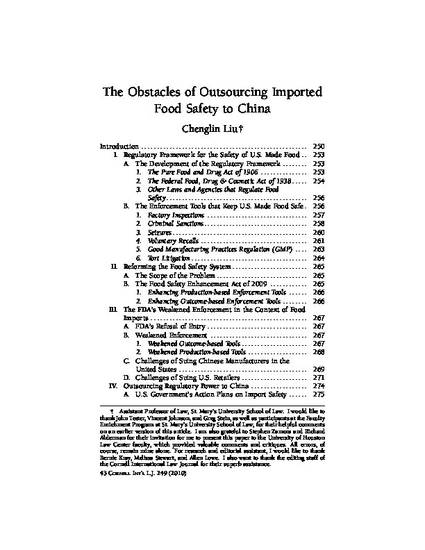
Outsourcing regulatory power through a bilateral agreement with China is unlikely to ensure the safety of imported food for two primary reasons: (1) shifting the regulatory burden does not present a feasible alternative to the traditional enforcement tools of outcome-based and production-based inspections and sanctions; and (2) China's burgeoning food safety regime, based on an entirely different culture and legal system, provides little incentive for Chinese food manufacturers to increase production costs to comply with U.S. standards.
There are three approaches for securing food safety in the U.S.: (1) increase inspections at the borders by utilizing traditional outcome-based enforcement tools; (2) certify and inspect foreign food facilities, utilizing production-based enforcement tools on exports to the U.S.; and (3) reduce imports by increasing domestic production. The most sensible approach to ensuring food safety in the United States is to increase domestic production. This approach, however, is difficult to implement, because it largely hinges on consumer demand.
U.S. food safety problems pale in comparison to those in China. There is no shortcut to food safety. Utilizing traditional outcome and production-based enforcement tools for imported foods is the only way to ensure food safety. Regulatory costs are inevitable. When the Food and Drug Administration implements direct supervision over imported foods, the rising regulatory costs will force importers to be vigilant about selecting supply sources, resulting in increased food safety. Greater regulatory expenditures will also put domestic foods on an equal footing with imported foods in terms of market competition. The simple truth is that with lax governmental regulation, producers under-invest in food safety. Consequently, regulatory power over food safety cannot be delegated.
